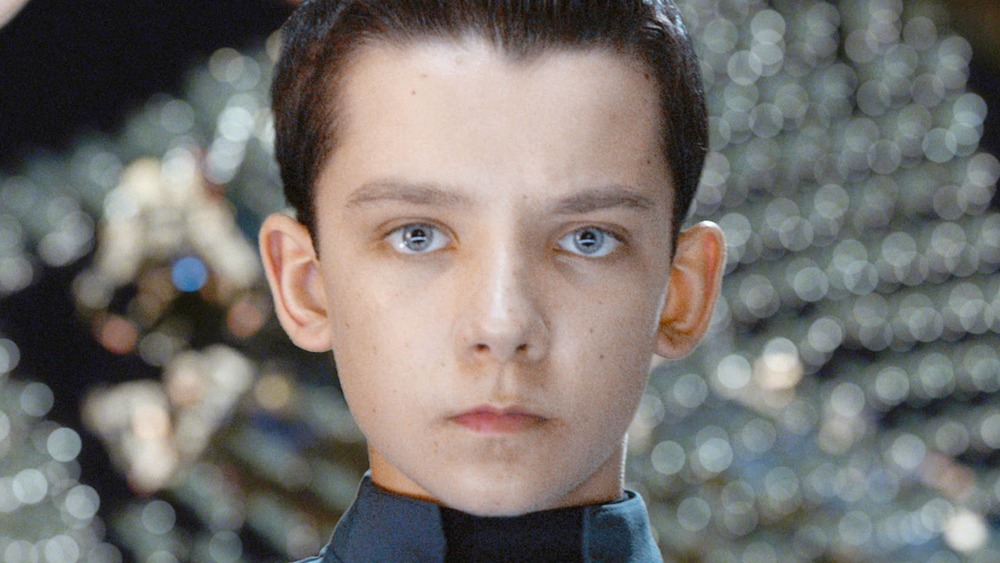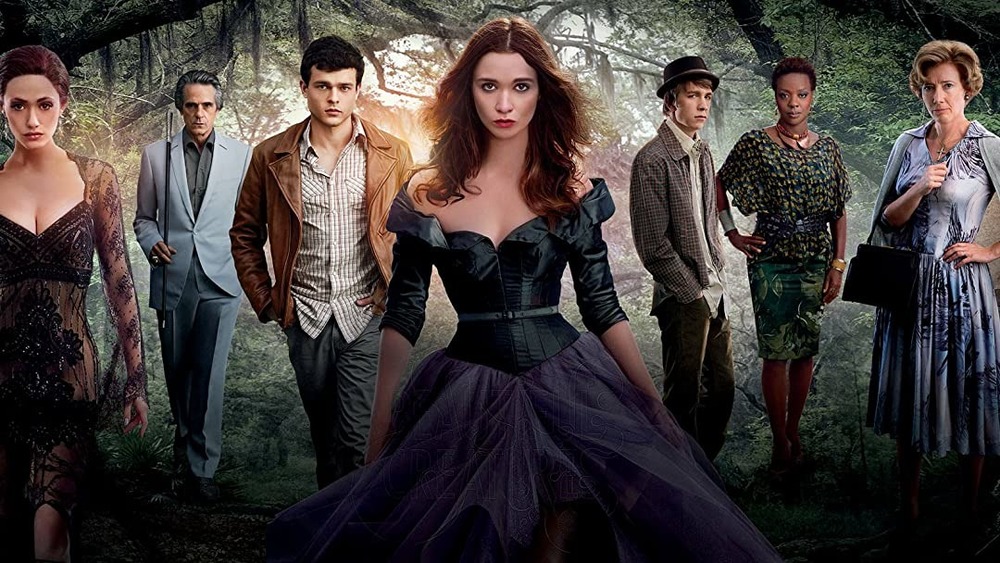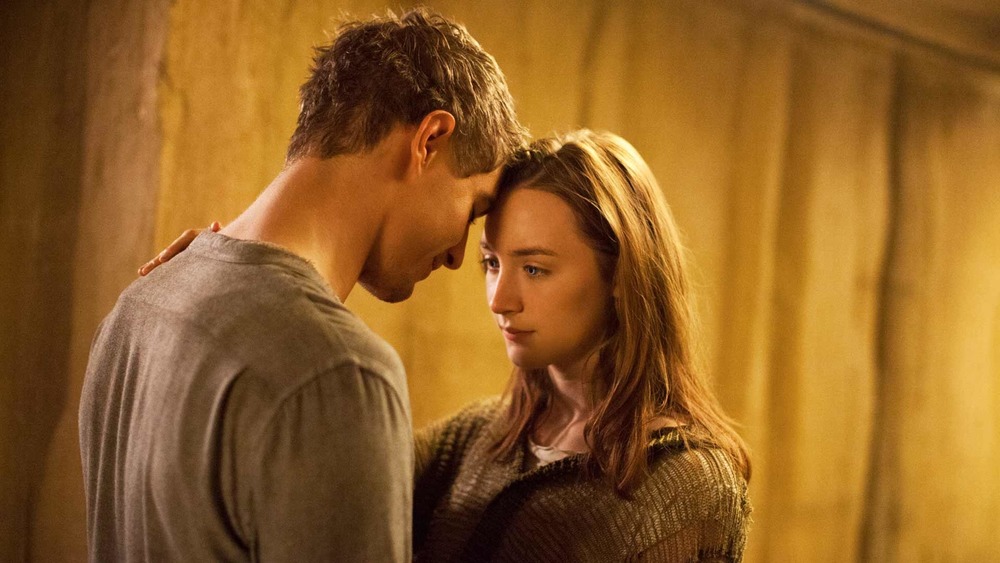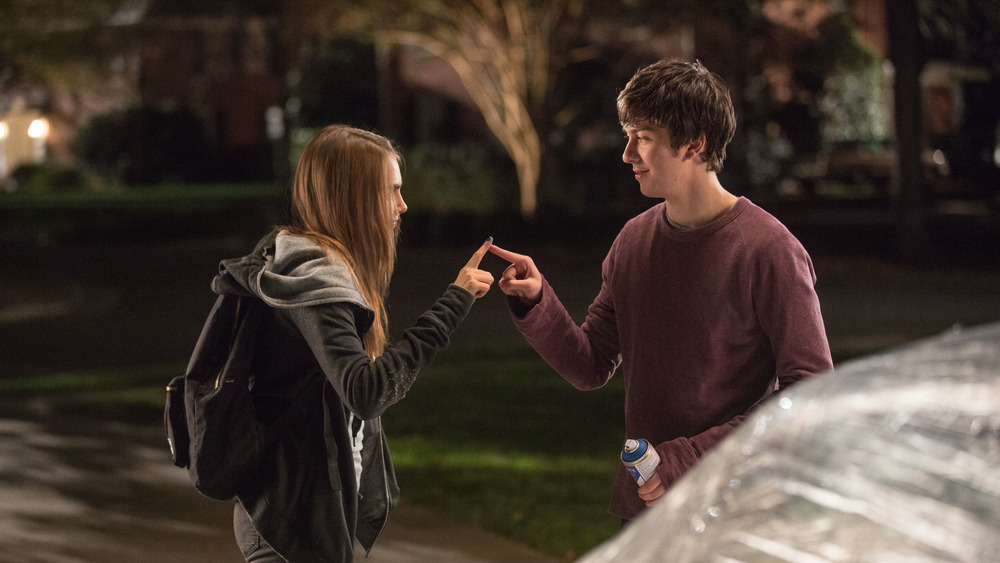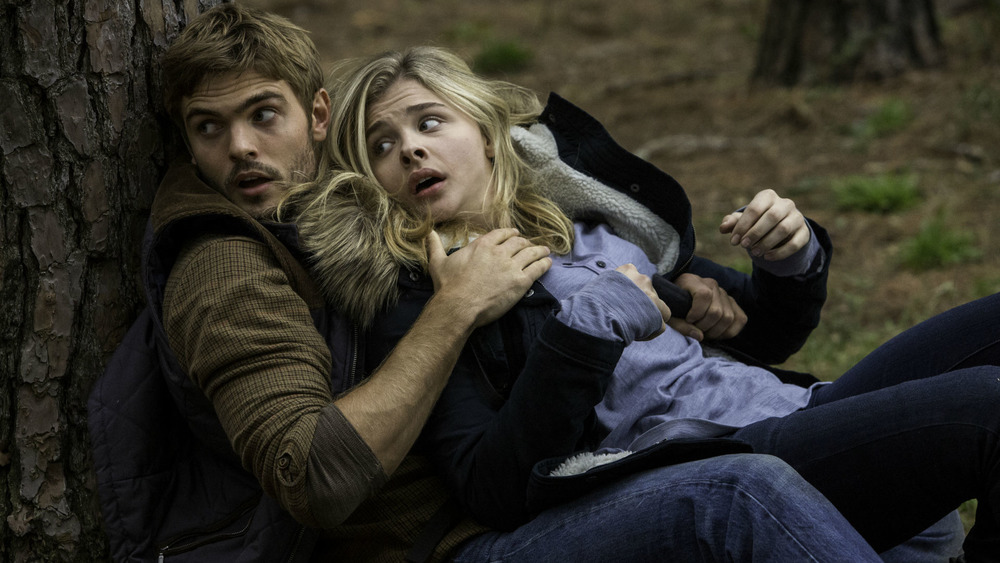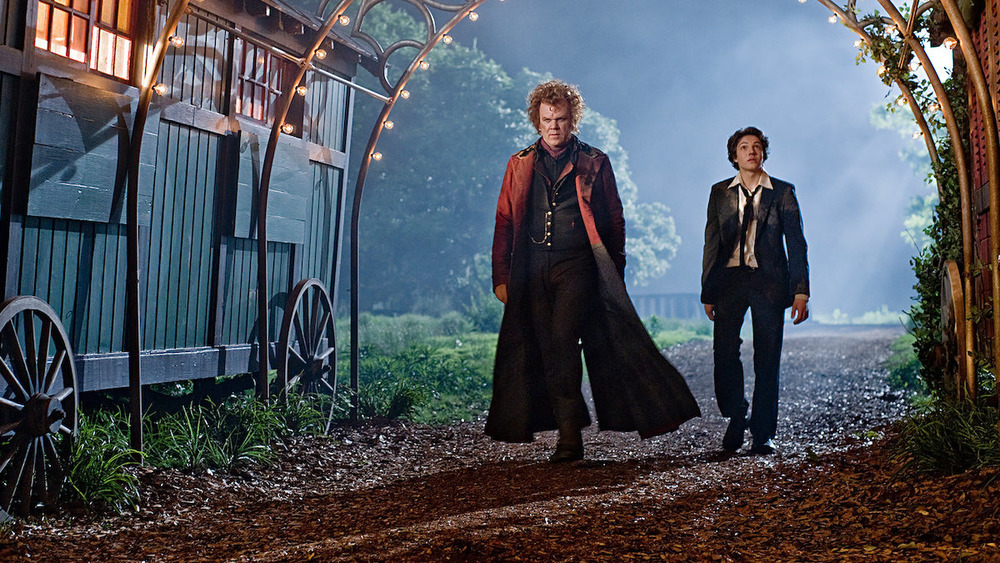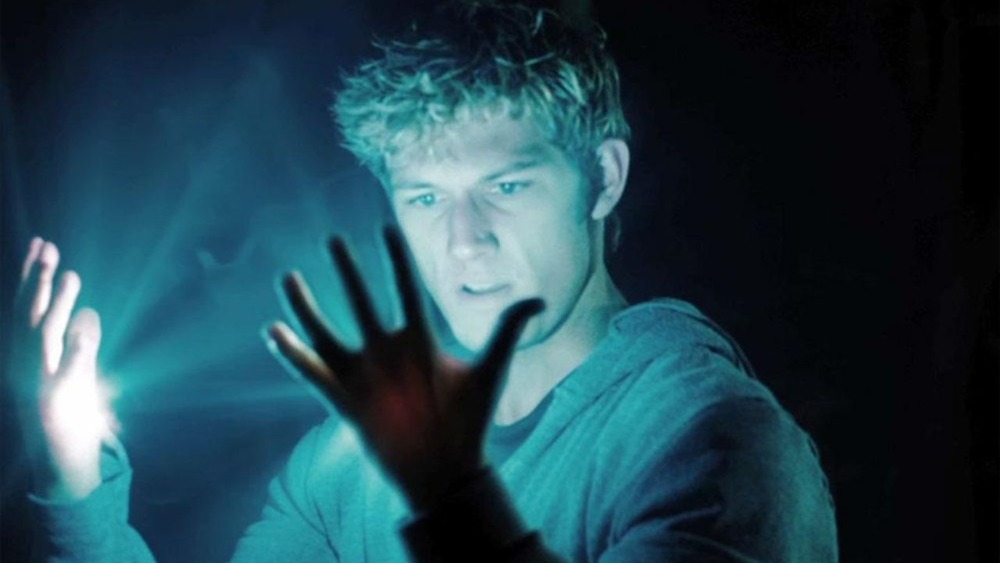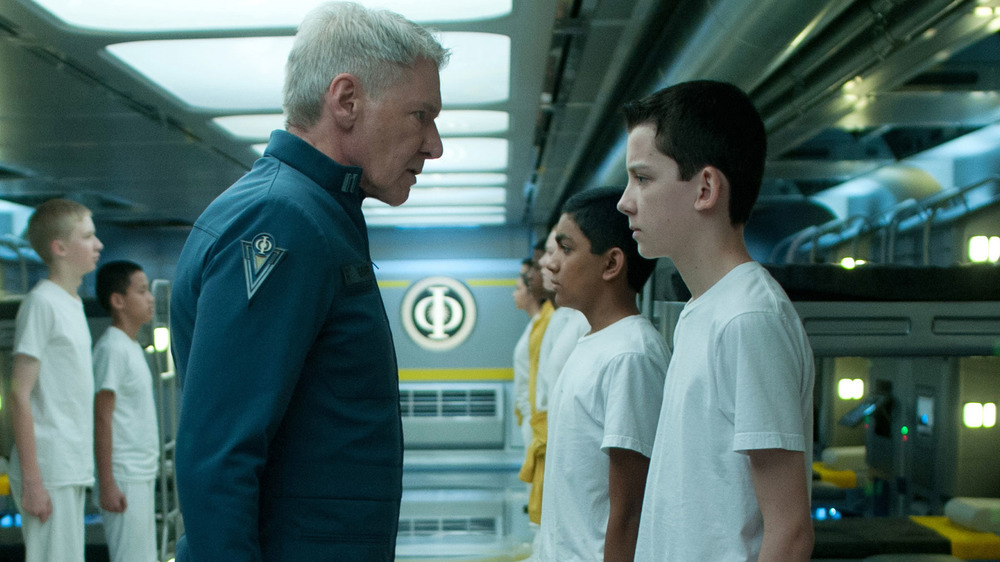The Real Reason These YA Novel Movie Adaptations Flopped
For a long stretch, the biggest film adaptations of Young Adult (YA) novels truly dominated the pop culture landscape. Twilight was a worldwide phenomenon, ditto for The Hunger Games and The Fault in our Stars. The trend continues even now with streaming titles like To All the Boys I've Loved Before. In the best cases for these adaptations, fans of the books come out in droves to see what these stories look like performed by flesh-and-blood humans. In the process, movie studios make a lot of money, especially since these films tend to be cheaper to produce than your average superhero flick. Meanwhile, actors like Robert Pattinson, Kristen Stewart, and Shailene Woodley get their careers kickstarted.
Of course, no genre is foolproof at the box office, and the realm of the YA novel adaptation is no exception. Just because the most famous examples of YA adaptations were massive sensations, that doesn't mean that's the norm for how these movies perform at the box office. Over the years, many of these titles have tended to struggle at theaters, stopping brand new franchises dead in their tracks. These films have underperformed for a whole slew of reasons, including the lack of a big fanbase for their source material and marketing that tries too hard to chase what's popular. Whatever the reason, these YA adaptations show that it's not as easy as it seems to make the next Twilight-level phenomenon at the box office.
Beautiful Creatures was a YA adaptation that missed out on the Twilight craze
Twilight had vampires and werewolves covered as far as teen-oriented romantic dramas went. But what other fantasy creatures could be applied to this genre? That was a question on everybody's mind as a slew of books and movies were being made to cash in on the success of Twilight. And the 2009 YA novel Beautiful Creatures answered with witches. Adapted into a February 2013 movie, Beautiful Creatures was entering the marketplace with a $60 million budget, it had the backing of Warner Bros., and it featured a star-studded supporting cast, including Viola Davis, Emma Thompson, and Jeremy Irons.
All of those qualities were meant to make Beautiful Creatures stand out among a wave of Twilight knockoffs, but none of that was enough to get audiences to care, as the movie only grossed $60 million worldwide ... the same as its budget. Part of the problem here was shifting tastes in the film's primary demographic. Beautiful Creatures wanted to be Twilight redux, but by February 2013, the Twilight franchise had ended, and teenage moviegoers had moved on to The Hunger Games. Beautiful Creatures wasn't even a cash grab of the hottest YA trend, it was a cash grab of a trend that had already come and gone. Unable to stand on its own two legs, Beautiful Creatures failed to prove that witches were the next logical step for YA audiences.
The Host didn't hook anyone with its weird premise
Today, Saoirse Ronan is best known as a multi-Oscar nominee who regularly works with acclaimed auteurs like Greta Gerwig and Wes Anderson. But in 2013, Ronan made a stab at mainstream Hollywood stardom by headlining The Host. An adaptation of a romantic sci-fi novel penned by Stephenie Meyer, The Host was about a girl trapped in a love triangle, similar to the author's previous love story – Twilight. This time, though, body-snatching aliens took over the part of vampires and werewolves. And instead of being pined after by two boys, the lead lady in The Host was overtaken by an emotionless alien. That's not exactly a premise that the target demo of these romantic dramas would want to live out.
Despite inherent problems with the setup of The Host, distributor Open Road Films felt they had the goods here, seeing as they put out a teaser on screenings of The Hunger Games, which was released a whole year before The Host's actual release. However, a long-term marketing campaign is no good if the film you're selling doesn't resonate with audiences. Unfortunately, The Host never had as compelling of characters as Edward or Jacob to work with, nor did its marketing lean into the unique qualities of aliens like the Twilight marketing did with vampires. Grossing only $63.3 million worldwide, The Host never spawned a franchise akin to Twilight, leaving Ronan time to do the kind of hefty dramatic roles that have really defined her career as an actress.
Paper Towns flopped hard after The Fault in Our Stars
In June 2014, The Fault in Our Stars became a massive box office hit that immediately established tragic teenage romances as the new go-to domain for YA novel adaptations. Everyone wanted to get in on this hot new trend ... and that included the very same studio that had just delivered The Fault in Our Stars. Distributor 20th Century Fox was keenly interested in adapting other books by Stars author John Green, such as Paper Towns. That particular novel was quickly green-lit to cash in on the success of Fault in Our Stars, though it wouldn't end up being anywhere near as lucrative.
Debuting in July 2015, Paper Towns mimicked the release strategy of Fault In Our Stars to a tee, right down to a summertime release. However, all of these maneuvers couldn't disguise the fact that Paper Towns just wasn't as beloved of a book as Stars. Plus, its premise of a guy looking for a missing girl he had a crush on wasn't as immediately distinctive as Stars' storyline — the tale of a cancer-stricken girl falling in love. If you're going to lean so hard on The Fault In Our Stars in your marketing, don't constantly reminds viewers how much better its plot was. These drawbacks bore out in the disappointing box office run of Paper Towns, which saw its domestic run top out at $32 million – $16 million less than what Fault in Our Stars grossed in its domestic opening weekend.
The 5th Wave was a YA adaptation that totally crashed
Timing wasn't The 5th Wave's strongest suit. When it arrived, not only had the entire Hunger Games franchise (which The 5th Wave was clearly mimicking) been released, Hunger Games knockoffs had begun to grow stale. Was the world craving another movie starring a teenage protagonist navigating a post-apocalyptic wasteland? Timely or not, The 5th Wave intended to show there was still life in this subgenre with its tale of a girl trying to reunite with her younger brother in the wake of a vicious alien invasion.
The premise was presented in an assortment of bland marketing materials utilizing imagery seemingly lifted from Battle: Los Angeles. Such uninspired marketing failed to captivate viewers. Worse, The 5th Wave wasn't based on a literary phenomenon like Twilight or The Hunger Games. Without either strong marketing or a well-known source material, The 5th Wave would have to work overtime to entice general moviegoers ... and such an audience never came.
The 5th Wave crashed in its late January 2016 release, grossing only $109 million worldwide on a $38 million budget. That was considerably below any of the YA novel adaptations it was clearly mimicking, and it also came up short when compared to sci-fi action movies in general. In the process, The 5th Wave failed to make a case for there being much interest in further Hunger Games knockoffs. As they say, timing is everything.
Vampire Academy failed to pass the test
One of the most forgotten Twilight knockoffs, Vampire Academy was based on a 2007 Richelle Mead novel of the same name. The film's struggle to garner notoriety stemmed from a number of factors, including its relatively obscure source material, but the issues mainly came from its North American distributor, The Weinstein Company. Vampire Academy's box office woes are one of many examples of how this studio had a terrible streak of trying to market and release mainstream entertainment. In the case of Vampire Academy, the trailer felt too generic, and the less-than-eye-catching poster could be summed up with its awful pun, "They suck at school." Bleh. In short, The Weinstein Company might've been skilled at promoting Oscar fare like Shakespeare in Love, but it wasn't great at promoting films towards teenage girls.
The inept release strategy sealed Vampire Academy's fate, though it also got hurt by a February 2014 release date that saw it competing for attention from couples against the likes of About Last Night and Endless Love, as well as battling against family fare like The LEGO Movie. And it probably didn't help that it had such bad reviews, earning a lousy 16% on Rotten Tomatoes. As a result, Vampire Academy grossed just $15.6 million worldwide. Plans for film adaptations of the various Vampire Academy sequel books were scrapped, and aside from a failed Indiegogo campaign, there's been no word on future media adaptations of the material. While the dismal reviews for Vampire Academy suggest the film was always going to struggle to attract moviegoers, a staggeringly miscalculated release strategy did it no favors.
Cirque du Freak: The Vampire's Assistant was viewed as an undead knockoff
It was a cosmic coincidence that Cirque du Freak: The Vampire's Assistant managed to come out in the wake of the first Twilight's movies success. After all, not every vampire movie, even ones based on novels aimed at teens, are inherently going to be chasing the success of Bella Swan. in the case of The Vampire's Assistant, it began filming nearly a year before Twilight's November 2008 premiere. Of course, the eventual success of the first Twilight movie certainly played like music to the ears of the producers of The Vampire's Assistant, which was an adaptation of a Darren Shan novel entitled Vampire Blood. Seeing that they had the next teen-oriented bloodsucker movie on the market, it's likely these filmmakers thought that they may have a new franchise on their hands.
In the end, what the producers actually had was a future box office flop. Grossing only $39.2 million worldwide on a $40 million budget, The Vampire's Assistant failed to make any kind of profit, let alone garner any sort of franchise. The issue here was most likely with the tone of its marketing, which tried to straddle the line between comedy and horror but never found a proper balance. It also struggled with the fact that movie vampires were so widely seen as a Twilight-only phenomenon made The Vampire's Assistant seem like (fairly or not) a cash grab.
The City of Bones was a YA adaptation that faded into obscurity
The Twilight series came to a close in November 2012. The following year was dedicated to a slew of YA novel adaptations duking it out to become the franchise's successor in the pop culture landscape. In retrospect, it's clear that The Hunger Games had already secured that title by offering something totally new. Thus, all the Twilight wannabes of 2013 were left chasing a pop culture throne that had already been filled. Among those films was The Mortal Instruments: The City of Bones, a story that involved a secret society of witches and other sorts of fantastical creatures hiding in plain sight.
Released in August 2013, The City of Bones was following hot on the heels of other similar titles like The Host and Beautiful Creatures. There really wasn't much hunger in the marketplace for more Twilight knockoffs and, combined with a generic marketing campaign, The City of Bones was widely ignored, grossing only $95.3 million on a $60 million budget. However, the film's producers weren't giving up on this potential franchise yet. Days before the first film opened, Sigourney Weaver began talks to join the sequel, City of Ashes, while one of the film's producers maintained that a sequel would still happen two months after this box office failure. Of course, a sequel never materialized, and The City of Bones became another Twilight wannabe that didn't make the cut.
I Am Number Four failed to engage teenage audiences
Wish fulfillment is a big part of what makes so many science fiction movies successful. In the case of I Am Number Four, the film had a major problem in making its sci-fi premise seem like anything remotely desirable to its audience. The film's protagonist, a teenage boy who's actually an alien, didn't get the cool powers that audiences like to imagine themselves with, like flight or telepathy. Instead, he could shoot bright lights from his palms, and that's all the marketing showed. However, that was just one of many issues I Am Number Four had to face. There was also the fact that its lead character was named Number Four, like this was some sort of stealth Codename: Kids Next Door reboot.
I Am Number Four and its premise of a humanoid alien who falls in love with a human girl in a small Ohio town while being on the run from an alien hunter had shades of Twilight all over it. This extended to how the source material was purchased by DreamWorks SKG shortly after the first Twilight movies release. In hindsight, I Am Number Four's $150 million worldwide gross was actually significantly better than the box office hauls of most other Twilight knockoffs that would follow. However, it was still largely seen as a dud, particularly when compared to the most lucrative YA novel adaptations. Maybe things would've been better if they had just given Number Four a different name?
The Divergent Series: Allegiant ended a YA franchise
Most YA novel adaptation flops are original films attempting to strike out a new franchise. It's a far rarer sight to see entries in ongoing YA novel adaptation franchises stumble at the box office. But that's just what happened with The Divergent Series: Allegiant, the third entry in the Divergent franchise. Intended to be the first installment in a two-part adaptation of the final Divergent book, Allegiant took a steep dive from its predecessors in terms of box office grosses.
At the worldwide box office, Allegiant grossed just $179.2 million, a massive decline from the $288 million and $297 million worldwide hauls of Divergent and Insurgent, respectively. So what happened? Well, Allegiant got hit hard by its competition. While the prior two Divergent movies had also debuted in March, they didn't face March 2016 juggernauts like Zootopia or Batman v Superman that Allegiant did. Further hurting things was that Allegiant was pretty costly, taking at least $110 million to produce.
By the end of its box office run, The Hollywood Reporter projected that Allegiant would end up costing distributor Lionsgate $50 million, a notable contrast to the high levels of profit the first two Divergent titles generated for the studio. As a result, the second half of the Allegiant book, which was set to be told in a movie titled Ascendant, went unadapted, and the franchise was stopped dead in its tracks. What a humiliating end for the Divergent saga.
Ender's Game was hurt by awful comments and a terrible release date
Prior to release, the film Ender's Game generated controversy for accusations of homophonic comments and behavior on the part of the author of the original book, Orson Scott Card. Such discourse dominated pre-release discussion of the film and led to speculation that it was the primary motivator behind the movie's eventually underwhelming box office grosses. However, there was more going on with Ender's Game than just the remarks of the author. The movie was already in trouble thanks to its large-scale marketing campaign, which made the Gavin Hood-directed film adaptation look less than enticing.
Though its source material was massively influential in the world of sci-fi literature, the Ender's Game movie was stuck with trailers and posters that made it look derivative of other sci-fi movies. Then there was Lionsgate's puzzling decision of when to release the movie. Ender's Game was scheduled to make its domestic bow a week before Thor: The Dark World and only three weeks before Lionsgate's own Hunger Games: Catching Fire, which limited the film's chances of box office success. In the end, Ender's Game grossed just $125.5 million on a $110 million budget. Card's controversial comments did Ender's Game no favors, particularly in helping to define so much of its pre-release conversation. But looking at the film's release as a whole, it becomes apparent that there were a lot of factors holding this movie back at the box office.
